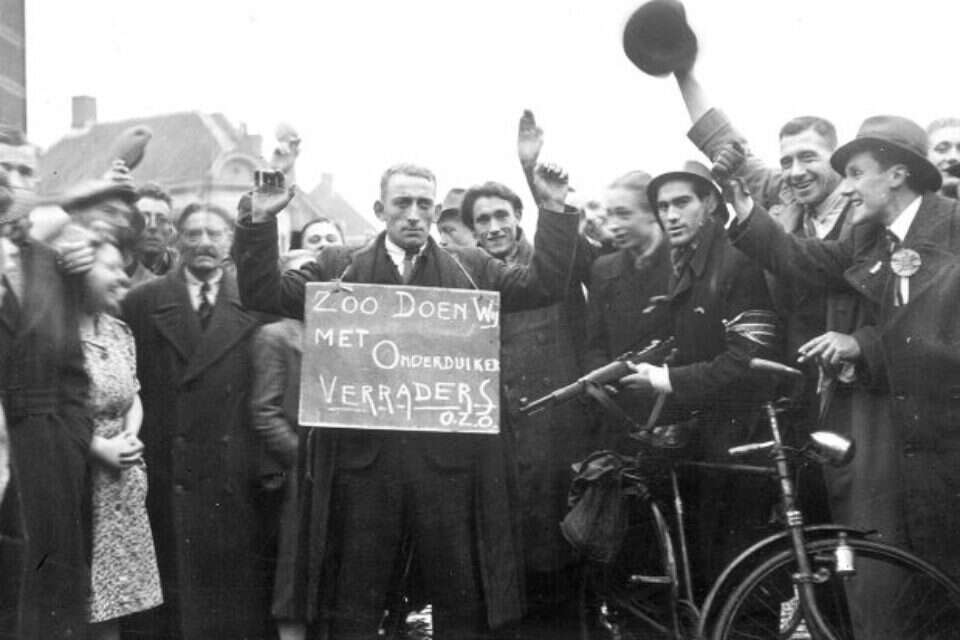Compared to many countries where it is customary to compile unofficial lists of the "most important books", in the Netherlands they went one step further and compiled at the beginning of this century the "Canon of Dutch Literature" - an official ranking of the country's best writers and best literary works.
Willem Fredrik Hermans was not only placed third on the prestigious list - he is the only writer whose two books entered the opening ten of the canon.
Now, thanks to Ran HaCohen's successful translation, Hebrew readers are exposed to one of them: the novel "The Dark Room of Damocles", which was published in the original language back in 1958, and is considered the fifth book in the ranking of the best Dutch literature of all time.
Even if you do not trust the judgment of the Dutch Literature Association, which had faith in the work of ranking, it is recommended to read the book and discover that it is no coincidence that even outside the Netherlands it is seen as a magnificent work of war literature.
Hermans, who died in 1995, actually thought that another novel from his pen, the surreal "De God Denkbaar, Denkbaar de God" (which was never translated into Hebrew), was the pinnacle of his prose.
However, the great international publicity and the status of the creator of the modern classics came to him thanks to "The Dark Room of Damocles".
Ostensibly, this is a suspense book describing the activities of the Dutch underground against the Nazi occupier.
The hero of the novel, young Henry Oswout, is recruited by a Dutch officer named Dorbeek for secret missions against the Germans, which gradually become more and more dangerous.
What begins with the development of images (today's readers expect a careful description of the technique lost in the digital age), continues with the hiding of British agents and even the murder of collaborators with the Nazis.
However, as the plot unfolds, the reality of the officer's existence will be undermined, and a growing doubt will arise around the essence of the tasks assigned to Oswat.
Who is he really: an underground friend or a traitor, a hero or a victim, or maybe just a madman who has lost his mind?
And why in the underground newspapers is Osweat portrayed as a very dangerous person, who betrayed hundreds of good patriots to the enemy?
To Oswat's astonishment, it turns out that everyone who knew the mysterious Durbak and could shed light on the affair is dead, and only Marian is still alive, but she too cannot be reached to reveal the truth, because she went to a kibbutz in the Land of Israel.
"Do you know what a kibbutz is?"
His Dutch researchers explain to him.
"You know? You don't know? A kibbutz is a farm surrounded by a moat and a barbed wire fence, and around them sits a herd of Arabs armed to the neck. How do you want us to take her out of her kibbutz to do some brief interrogation?"
If the plot concocted by Hermans seems familiar to you, you are not alone.
When John Le Carré's well-known novel, "The Spy Who Came Back from the Frost", was published five years after the publication of "The Dark Room of Damocles" (and only one year after the publication of the English translation of the book), Hermans immediately suspected that it was plagiarism.
At the same time, he emphasized the difference: Le Carré's novel is nothing more than an entertainment story, while "The Dark Room of Damocles" raises serious and weighty philosophical questions.
It is impossible not to agree with him, because his detective book takes the form of a psychological novel, which deals with what intrigued Hermans throughout his literary career - his perception of man's inherent inability to understand himself and the world he lives in.
Order - such an important element in the rational worldview, on which Dutch culture is founded - is absent from Hermans' world, and in its place chaos takes over everything, which inevitably leads to insecurity and thoughts about the nothingness of human existence.
In such a system, the concept of truth becomes dim and deceptive.
Can we not know reality to such an extent that the past is also uncertain, the writer wonders, and doubt offers an answer.
It is indisputable that the reality of life under German occupation, with its tests and choices between idealism and opportunism, Hermans knew well.
As far as is known, he was not among the ranks of the underground, but in 1943 he was forced to stop his studies at the university due to his refusal to declare loyalty to the Nazi regime.
He also knew the common moral concepts that led some of his people to oppose the occupier, and the others, more numerous, to help the Germans, and he was not at all satisfied with them.
The critical view of Hermans, who often defined his writing as "creative nihilism", cannot be easily ignored.
Even as an essayist, the writer often doubts the good virtues of man, and in the pages of "The Dark Room of Damocles" this spirit blows strongly.
Hermans prefers to put one of the cynical accusations in the mouth of a collaborator with the Germans, who proudly calls himself an intellectual, thinks in Dostoevsky's work and arrogantly philosophizes about the wandering nature of morality: "You know what the problem is with most Dutch people? That they never learned to think. Look at me I joined the SS a year ago. I am a great amoral theorist.
A theorist, because I can't see blood, and besides, I joined the SS after Germany had already lost the war and other SS men were looking for ways to get underground.
I did not believe in the SS at all, in the thousand-year Reich and all the nonsense that, according to the newspapers, every SS man believed.
But what I do believe is that morality is merely a working assumption with temporary validity, and that after the death of the person all morality will come to an end.
"It all boils down to the fact that man is mortal, and he is not ready to admit it," the villain continues to pour out his "I believe".
"But for someone who knows that he must die one day, absolute morality cannot exist. For him, kindness and mercy are nothing more than disguises of anxiety. Why should I behave morally if in any case I am sentenced to death? Everyone is sentenced to death, and everyone know that."
This Dutchman, a kind of collective portrait of all the criminals from among his people, does not regret and does not hide what he did.
"Persecution of Jews?" he dismisses casually, and provides a prophecy: "Listen to what I say! In about twenty years the English, the Americans and the Russians will let the Arabs destroy the Jews, if it suits them."
We must admit that if it had only depended on the English, the Americans and the Russians, the SS man's prophecy would have come true.
Willem Frederick Hermans / The Dark Chamber of Damocles;
From Dutch: Ran HaCohen, Am Oved, 384 p.
were we wrong
We will fix it!
If you found an error in the article, we would appreciate it if you shared it with us









